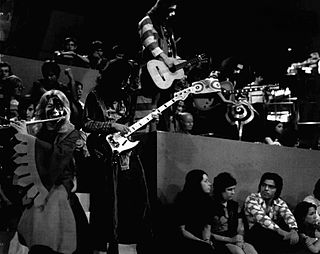
Zarathustra is the debut studio album by Italian band Museo Rosenbach released in 1973. It is generally regarded as one of the best Italian progressive rock works of all time.
Cervello ("Brain") is a band from Italy.

Banco del Mutuo Soccorso is an Italian rock band. A popular progressive rock band in the 1970s, they continued making music in the 1980s and 1990s. They were still active, playing live in 2001 and 2008 at NEARfest. Their charismatic frontman, Francesco Di Giacomo, died in 2014.

Le Orme is an Italian progressive rock band formed in 1966 in Marghera, a frazione of Venice. The band was one of the major groups of the Italian progressive rock scene in the 1970s. They are one of few Italian rock bands to have success outside their own country, having played concerts across North America and Europe, and releasing an album in English at the height of their success.

Il Balletto di Bronzo is an Italian progressive rock band from Naples. The band was initially formed as the I Battitori Selvaggi, and played Nato bases in Italy. Early members included Raffaele Cascone, a progressive guitarist and Freddy Cannon on drums. Cannon would later become a very successful record company executive with EMI, Carrere, PWL and join BMI as a senior executive in 1994. They changed their name to Il Balletto di Bronzo in 1969 and released two singles, Neve Calda / Comincio 'Per Gioco (1969) and Si, Mama Mama / Meditazione (1970). The albums Sirio 2222 and Ys followed, before they before disbanded in 1973.
Presto Ballet is a progressive rock band founded by Metal Church guitarist Kurdt Vanderhoof. Their sound is highly reminiscent of 1970s prog rock, as the band was founded chiefly as a tribute to classic progressive bands such as Yes and Kansas.
"Starless" is a composition by English progressive rock band King Crimson. It is the final track on their seventh studio album, Red, released on 6 October 1974.
Locanda delle Fate is an Italian progressive rock band from the end of the Italian progressive rock movement.
Alphataurus is an Italian progressive rock band from the Milan area. Under the original lineup Alphataurus released only one album, Alphataurus, dated 1973, at the peak of the European progressive rock wave. The album was generally well received, and work on a second album started, but due to "a string of personal events" the band split up in 1973. The band is named after Aldebaran, the brightest star in the Taurus constellation.
Il Rovescio della Medaglia, or RDM, were an Italian hard rock and symphonic rock band. They are most famous for their symphonic rock piece Contaminazione, released in 1973. It contained four pieces from Bach's Well-tempered Clavier seamlessly integrated with RDM's own music, which often was inspired by rock or hard rock. In 1974 the record was released in an English version, Contamination, with the group's name simplified to RDM, although still written in full on the back of the LP jacket.
Wobbler is a Norwegian progressive rock band formed in 1999.

Osanna are an Italian progressive rock band.

Hero and Heroine is the seventh studio album by English band Strawbs.

Come in un'ultima cena is the sixth studio album by Italian progressive rock band Banco del Mutuo Soccorso. The English version of the album was released with the title As in a Last Supper.

Banco del Mutuo Soccorso is the eponymous debut album by Italian progressive rock band Banco del Mutuo Soccorso.

Banco is the fourth studio album by Italian progressive rock band Banco del Mutuo Soccorso. The album was originally released in 1975 on the Manticore Records label launched by Emerson, Lake & Palmer.

Nosound is an Italian alternative rock band started in 2002 by Giancarlo Erra. The group plays music in several different genres, including alternative rock, post rock, electronic, and ambient. All their early recordings were composed, performed, produced, engineered, and released by Erra, who subsequently formed Nosound in 2006.
Acqua Fragile is an Italian progressive rock band, active from 1971 to 1975 and from 2013 to the present. The band was established in the city of Parma. Bernardo Lanzetti, leader and vocalist of the band, is best known for his work with Premiata Forneria Marconi and has played in many other progressive rock acts, including neoprogressive band Mangala Vallis.

Canto di primavera is the eighth studio album by the Italian progressive rock band, Banco del Mutuo Soccorso. the album was first released in 1979. the album marked the return to lyrical songs after the instrumental album, ...di terra. the album reached to No. 36 in the Italian album chart.
Giancarlo Golzi, was an Italian drummer and songwriter, a founding member of the Genoan band Matia Bazar.











